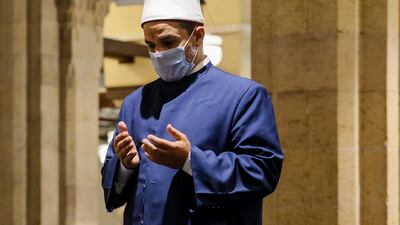Muslims around the world are starting to make plans for Eid Al Fitr, the day that marks the end of Ramadan and is normally celebrated with large feasts and family gatherings where adults offer gifts to children. In the time of coronavirus, however, some aspects of these traditional Eid celebrations come with risk. With large gatherings banned and physical distancing measures still in place, families are being asked to honour the spirit of the holiday with the realities of the pandemic in mind.
The UAE government, along with those of other Muslim countries, has introduced stricter public policies for this year’s Eid Al Fitr in an effort to raise awareness and discourage irresponsible behaviour.
Starting Wednesday, the UAE's daily sanitisation programme has been extended and tougher fines introduced. These include a Dh3,000 fine for those wandering outside without a face mask, Dh50,000 for people who fail to quarantine when required and Dh10,000 for those caught organising gatherings, with an additional Dh5,000 for attendees.
The new rules have been announced after a spike in the number of coronavirus cases over Ramadan. On Monday, the UAE announced 832 new cases after 37,844 additional tests were carried out, bringing the total number of infections to more than 24,000. The government has embarked on a mass-testing campaign to detect coronavirus cases early on and to provide patients with adequate medical care. This includes free screening of everyone living in Abu Dhabi’s Mussafah, a residential neighbourhood home to low-income workers, in addition to ongoing testing and the sanitisation programmes already in place in the area. More than 120,000 residents of Mussafah have been tested so far.
Prior to the holy month, health authorities conducted approximately 20,000 tests per day, a number that has now nearly doubled. Increased testing explains, in part, this spike in infections, but UAE officials have also warned that carelessness may have driven infection rates up. “In Ramadan, there has been an increase in cases as a result of some individuals who were reckless and didn’t take measures into account,” according to Dr Mohammed Al Dhaheri, spokesperson for the National Authority for Emergency, Crisis and Disaster Management.
Even as some restrictions were relaxed for Ramadan new rules were introduced, such as wearing masks in public and avoiding overcrowding. These measures are crucial for public safety and for keeping those most vulnerable healthy and coronavirus-free. Flouting restrictions amounts to endangering oneself and putting the health of loved ones at risk. To avoid this situation, people must follow health guidelines diligently, not only throughout Ramadan but also for Eid, and resist the temptation of hosting or attending large gatherings for this occasion. Heeding and sharing the advice of health experts can prove to be life-saving. Dr Al Dhaheri, for instance, has advised against giving money or gifts to young people in person during this occasion in order to decrease risks of infection. Instead, families could opt for an online money transfer, or, if necessary, only use paper bills after they have been thoroughly sanitised.
The spirit of Eid Al Fitr is not only about gathering with loved ones. It is also about sacrifice and acknowledgement of what is really important. As the date for Eid approaches, let us celebrate safely and keep one another out of harm’s way.


